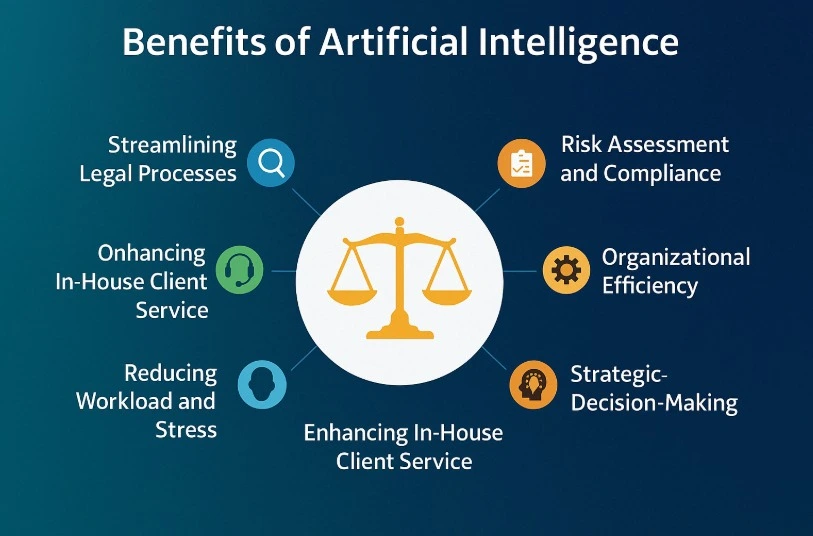Legal studies can be overwhelming, let’s face it.
And AI might be the answer that instructors and legal students did not realize they needed.
Law students may become anxious and doubt their preparedness for the future as a result of attempting to keep up with dense texts, legal jargon, mock trials, and constant case analysis.
How do you go from theory to court-ready skills? This is a real-world transfer that even the best law students find difficult. Additionally, the lack of in-person services puts additional strain on online universities and distance learners.
Artificial Intelligence (AI) can help with that. AI is rebuilding the delivery and consumption of legal education, from more intelligent research to simpler preparation for mock trials.
Let us investigate how.
Artificial Intelligence in Corporate Legal Departments (and Why It Matters to Students)
For quicker research, more accurate risk assessments, and cleaner document production, today’s law firms, particularly corporate ones, are investing in artificial intelligence. Early exposure to these resources gives pupils an advantage when they enter internships or careers.
The American Bar Association claims that leading law firms are saving hundreds of hours annually by utilizing AI for document review, legal research, and contract analysis.
Now consider the implications for a professor or student attempting to prepare for a paper, a mock trial, or a class.
Related Article: https://heyeve.ai/blogs/ai-in-legal-education/
The Benefits of AI in Law
Benefit of AI in Legal Studies #1: Streamlining Legal Processes
Law students, along with legal professionals, now perform research in a completely different manner through the radical impact of Artificial Intelligence. Time-consuming manual research through books at the library stood as the traditional method for locating suitable case law. Using Casetext or ROSS AI tools allows users to search through thousands of legal documents while using basic questions such as “What are the key rulings in contract law?” instead of requiring complex legal questions. Through this method, students can allocate their time to legal knowledge acquisition as well as argument development and critical analysis instead of information retrieval tasks. The platform enhances legal education delivery speed and effectiveness when combined with other classes and remote learning needs.
Benefit of AI in Legal Studies #2: Risk Assessment and Compliance
The essential ability that legal education must provide to students consists of early problem detection. That’s where AI shines. The system performs assessments of legal papers by identifying vulnerable points like current rule violations or unstable contract terms. The ability to handle cases with future-oriented thinking becomes available to students through this approach. Instructors utilize AI technology to build assignments that bring authentic risk-based legal scenarios for student training. The simulation helps future lawyers develop analytical capabilities through corporate legal team methods that protect businesses from future problems.
Benefit of AI in Legal Studies #3:Quality Assurance in Legal Documentation
Clear and precise, along with detailed language, defines legal writing that demonstrates exceptional quality. The pressure to produce strong legal writing induces difficulty for law students, although they face challenges in making their work free from errors. The AI-enabled scanning system of LawGeex and Kira Systems automatically identifies legal document flaws, including absent clauses, repetitive terms, and inconsistent document layout.
Instant feedback from these tools assists students who are learning to produce memos, contracts, and case summaries. The platforms deliver both speed and precision in their services. The accuracy rate of AI systems reached 94% when compared against lawyer NDA reviews, according to LawGeex research. The advantages of better academic achievement and improved practical abilities accompany this tool for student use.
Benefit of AI in Legal Studies #4:Organizational Efficiency
Students face tremendous academic pressure when handling their assignments together with law case readings, mock trials, and class lecture notes. AI-based systems took over the responsibility of handling organizational challenges. The software performs multiple tasks, which include automatic subject groupings of case laws while also creating compact reading abstracts and supplying case suggestions to assist with academic projects.
The software system provides formatting tools for citations as well as automated study schedule generation that relies on recorded student workload. Students dedicate more attention to essential learning activities because AI manages time-consuming organizational tasks that otherwise would lead to exhaustion. This system functions as an educational assistant that was specifically designed to aid law school activities.
Equip Future Attorneys with Practical Courtroom ExperienceThe VR + AI mock trials from HeyEve aid in bridging the theory-practice divide.
Benefit of AI in Legal Studies #5:Strategic Decision-Making
Among its multiple applications, AI software assesses court records to assist students in creating better arguments by providing them with strategic decision recommendations. AI software helps students prepare for mock trials by showing case examples and explaining which decisions judges made in analogous situations in the past, along with valid reasoning. Through its analysis, the tool enables students to develop strategic thinking abilities that mimic the behavior of professional lawyers. Students acquire knowledge about court rationale in addition to basic case findings through this process. Legal learners benefit enormously from this form of intelligent observation to develop their skills and expertise as future lawyers.
Benefit of AI in Legal Studies #6:Reducing Workload and Stress
Law school is intense. When students need to meet deadlines while handling large amounts of reading material, together with performance expectations, burnout becomes a frequent occurrence. The pressure on students is reduced because Artificial Intelligence performs manual responsibilities.
The use of AI tools allows students to complete formatting tasks and execute proofreading support, and find the best case at high speed with excellent precision. Time efficiency and lowered mental workload permit students to dedicate their efforts toward significant learning material. Lawyers who use AI tools in Thomson Reuters surveys noted reduced feelings of being overwhelmed, so these benefits immediately appear during classroom activities.
Benefit of AI in Legal Studies #7:Enhancing In-House Client Service
The present legal student workforce aims to join corporate legal departments where client communication, along with problem-solving, form crucial skills. True-to-life simulations happen with the assistance of artificial intelligence. Students can use AI-powered chatbots to improve their skills in responding to clients via questions and answers. They can participate in virtual reality mock trial experiences because of sets like Heyeve, through their system from any location. Such technology serves students who attend online universities and students who are distant from each other because these platforms deliver virtual teaching opportunities. Students who use these tools become more capable of delivering effective client service with precision while exhibiting quick-wittedness through laptop and virtual reality headset interfaces.
Conclusion: The Future of AI-Assisted Legal Studies Is Here
Law students are being empowered by AI, not replaced.
AI makes legal education quicker, smarter, and more accessible by assisting with research, drafting, and strategy, especially for students studying online or in remote locations.
Therefore, incorporating AI into your toolkit is not only a wise decision but also essential for the future of law, regardless of whether you are a first-year law student or getting ready for the bar.


